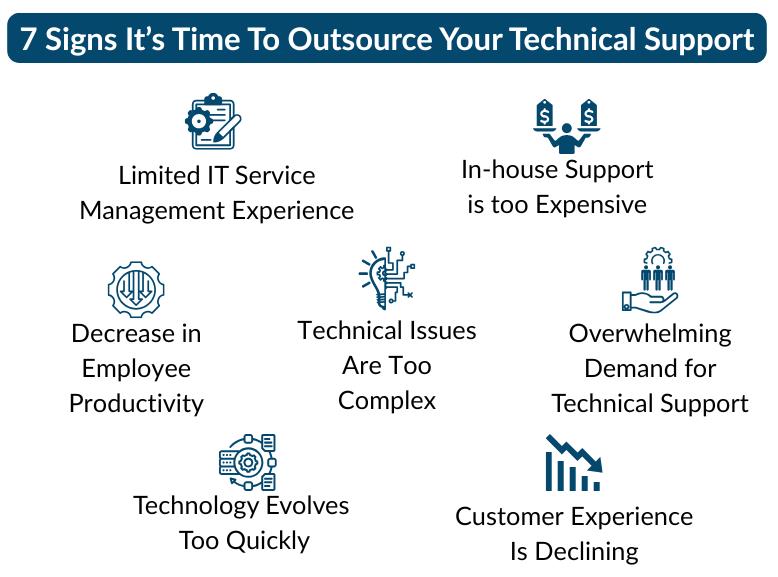7 Signs It’s Time to Outsource Your Technical Support
Technical support plays a crucial role in your customer experience. Outsourcing this to a qualified provider of technical support services will dramatically improve efficiency, free up resources, and improve productivity.
Read Time: 6 minutes
Table of Contents
As companies grow, so do the challenges of maintaining technical support. Managing IT in-house may seem more efficient at first; however, the cracks begin to show once demand increases, productivity slows, and the customer experience declines. A slowdown in productivity, rising costs, and poor support quality are just a few signs that your business is ready for a change. Let's break down the top 7 signs that indicate it's time to outsource your technical support.
The 7 Indicators to Outsource Tech Support Services
Outsourcing technical support provides so much more than savings. It can help improve how your business operates and even offer a better customer experience. Issues like internal delays, higher support costs, and growing customer frustration are not just growing pains. They are red flags that your current support model is no longer sustainable. Here are seven undeniable indicators that it is time to consider a more strategic approach through outsourcing IT solutions.

1. Increasing Demand for Technical Support
One of the main reasons you know it's time to outsource your IT support is that your staff just can't keep up with demand. This issue really isn't that uncommon with growing companies. Unfortunately, though, your team is feeling the heat, and they are more overwhelmed; response times are way longer, and there is a growing number of unresolved tickets.
Outsourced IT solutions provide companies with access to scalable solutions to help companies easily adjust their volume depending on their business needs. Get the staff you need, when you need it, without the extra overhead cost and spent resources.
A real-world example of this challenge comes from a well-known fashion retailer that experienced issues with scaling while dealing with a high volume of customer phone calls and emails. Their internal team was struggling to keep up, and this resulted in huge delays in responses and a ton of missed sales opportunities. Fortunately, ROI CX Solutions was able to provide trained agents equipped to handle all customer inquiries. We also specialize in various technology services, so we integrated an interactive virtual agent to further reduce costs and improve the customer experience.
If your team is feeling the strain from rising demand, it may be time to outsource.
2. Employee Productivity is Lagging
Another side effect of not having the proper technical support is that your team is constantly being pulled away from core tasks. The constant influx of IT issues and customer technology inquiries is enough to overwhelm your staff and distract them from essential tasks. These interruptions in turn reduce the focus and thus the output of your staff, affecting their KPIs. It's a slippery slope. When your employees can't fulfill their job duties, productivity declines, and you face a real issue with company morale. Without the ability to properly manage technical demands, your entire team is at risk!
This is where efficiency in IT is crucial. A dedicated, remote support partner will handle these requests and offload the extra work from your internal team. Your staff now happily focus on their normal job duties, and you can rest assured your technical support is being handled by experts in the field.
3. Rising Costs of In-House Support
The reality is costs are rising, and in-house support is more expensive than ever. So much goes into hosting your own support team, and things add up. Salaries, benefits, training, are just a few of the many fees that come from your budget. Not to mention all the costs associated with IT infrastructure like:
- Software
- Hardware
- Compliance Expenses
- Maintenance
There is also the hidden cost of turnover. Burnout from all of these extra IT tasks may cause your staff to quit, leaving you with gaps that require rehiring and training. Outsourcing takes care of these issues by providing a consistent team and clear pricing expectations to help you manage your budget.
4. Limited Expertise in IT Service Management
It's not uncommon for internal teams to lack specialization in IT service management, that focus on Service Level Agreement (SLA) tracking and root cause analysis. This means that the company is most likely providing inconsistent, reactive support. Without a formal framework, like the Information Technology Infrastructure Library (ITIL), support teams may rely more on quick fixes rather than long term solutions.
Companies need to provide proactive, strategic IT operations which can be done by a third-party provider. Outsourcing teams are staffed with professionals that apply best practices, technology stacks, and structured processes that improve the customer experience.
5. Declining Customer Satisfaction and Experience
If you're dealing with long wait times and repetitive issues that keep piling up, it's time to outsource your technical support. Some issues you're dealing with might be:
- Long wait times
- Repeated eros
- Unresolved issues
- Inconsistent support quality
Customers notice these problems, and they remember. In fact, a survey conducted by CSA revealed that 49% of customers have left a brand they loved based on a negative CX experience. It's clear that investing in technical support services helps improve the customer experience because the provider is better equipped to handle customer inquiries with speed and consistency. Again, outsourcing provides companies with well-trained agents that understand your brand and solve problems efficiently.
6. Inability to Keep Up with Emerging Technologies
The reality is technology evolves quickly, and many organizations just don't have the time or ability to stay current. Your in-house team is probably struggling to handle:
- Integrating new CRMs
- Rolling out updates
- Deploy tools like AI-powered chatbots
Finding a provider that offers remote tech support brings back the competitive edge to your business. They can handle managing modern platforms, onboarding new technologies, and ensure your company benefits from a variety of automations like real-time analytics, and proactive monitoring.
7. Complexity in Technical Issues Is Growing
Technical issues today are multilayered, involving cloud infrastructure, cross-platform integrations, cybersecurity, and regulatory compliance. It can be hard to keep up. If your support team spends most of their time escalating tickets or fails to resolve advanced problems on the first attempt, your business is at risk of recurring outages and inefficiencies.
The increasing complexity demands a level of expertise as well as scalability that your organization may be unable to provide. Outsourced teams are ready to face these challenges head-on, getting faster resolution times and fewer disruptions to your daily operations.
Benefits of Outsourcing Your Technical Support to ROI CX Solutions
Your business can significantly improve and grow when you partner with ROI CX Solutions. Our years of experience in technical support services and IT service management allows us to help businesses shift from reactive troubleshooting to proactive support strategies.
ROI CX Solutions delivers round-the-clock, multilingual support with deep expertise in handling everything from basic tech issues to complex challenges. We specialize in scalable, outsourced IT solutions designed to meet your goals. If you're ready to improve resolution times, increase customer satisfaction, and relieve your team from day-to-day support tasks, we've got you covered.
Outsourcing to ROI CX Solutions also means gaining access to the latest tools, structured workflows, and performance-driven KPIs. We work as an extension of your brand, providing seamless integration with your systems, and do everything we can to help your business grow.
Connect with ROI CX Solutions today and learn how we can help your business scale smarter, support better, and focus on what matters most.






